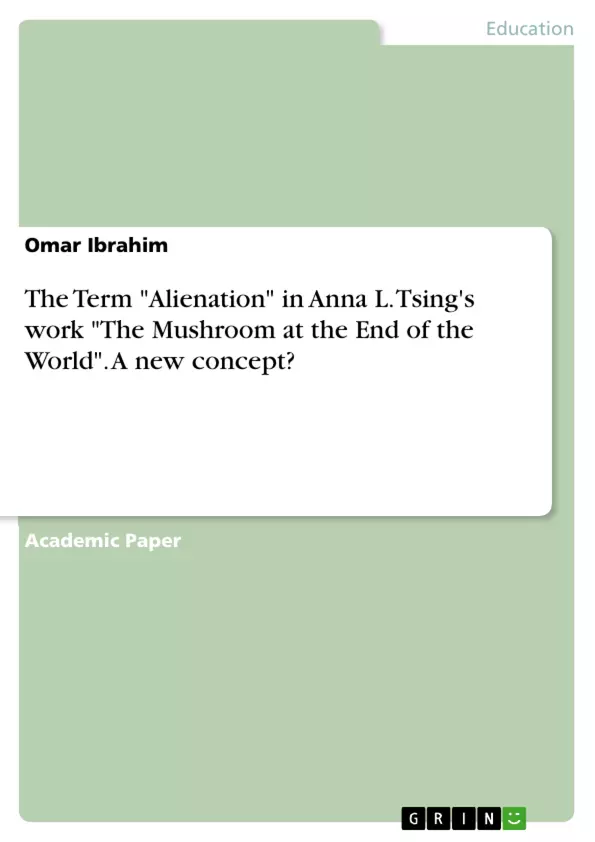The present work is of a theoretical kind and attempts to make philosophical and conceptual ideas fruitful for ethnographic research. It deals with the term "Alienation" and a new concept of it by the author herself.
In her work The Mushroom at the End of the World Anna L. Tsing investigates the question of what remains after capitalism and its developments. Not very much anymore, she claims. Thus she examines the various forms of ecological and social life within capitalist ruins. The main role in her investigation is played by the Matsutake mushroom, an edible and also precious mushroom, which is some sort of an artefact fungus. This means that it grows best where humans have exerted a considerable influence on the environment. Her patchwork ethnography traces a rhizome-like interweaving of heterogeneous fields of investigation. One of the few constants in her work is the term "alienation". Tsing introduces the term with the assertion that alienation transforms people and non-human entities into movable goods. Alienation therefore also creates the capitalist ruins, leaving behind those places unsustainable from which people and other things have been moved out as goods. Alienation is in this respect a deficient relationship. It denote a disturbed world- and self relatedness. What stands out further is that the Matsutake mushrooms, for example, can assume different stages of alienation. While they are still perceived by mushroom pickers as meaningful trophies, they are alienated as market products within the international supply chains. Only again in the Japanese exchange of gifts can the Matsutake mushrooms be released from their alienated status.
I have noticed that the term is theoretically not negligible in Tsing's work, but unfortunately, it remains under-determined. Much of the term remains unexplained and thus incomprehensible. Furthermore, it is immediately apparent that the term in Tsing's work is partly opposed to the classical or everyday understanding of "alienation". In the present work, I would therefore like to deal with the question of how "alienation" can be understood in Tsing's work. I will first trace the classical concepts and connect them with Tsing's ideas.
Inhaltsverzeichnis (Table of Contents)
- Introduction
- Postmodern alienation
- Against essentialism
- Flat ontology
- Alienation in Marx' work
- Alienated labor conditions
- Appropriation
- Alienation in Heidegger's work
- Befindlichkeit
- Authenticity
- Resonance
- Conclusion
Zielsetzung und Themenschwerpunkte (Objectives and Key Themes)
This work aims to analyze the concept of "alienation" as employed by Anna L. Tsing in her book, "The Mushroom at the End of the World." It examines how Tsing's understanding of alienation deviates from classical conceptions and how it can enrich anthropological research. The study will delve into the theoretical underpinnings of alienation, tracing its evolution through postmodern thought, Marx's work, and Heidegger's philosophy, ultimately proposing a new understanding of the concept in Tsing's context.
- Postmodern critique of essentialism and its implications for understanding alienation
- The shift from a vertical ontology to a flatter ontology in understanding human-environment relations
- Alienation as a deficient relationship impacting both humans and non-human entities
- The role of resonance as a counterpoint to alienation in Tsing's framework
- The application of the concept of alienation to enrich ethnographic research
Zusammenfassung der Kapitel (Chapter Summaries)
- Introduction: The chapter introduces the concept of alienation in Tsing's work, highlighting its theoretical significance and its divergence from classical understandings. It outlines the purpose and structure of the study, which aims to provide a philosophical and conceptual framework for understanding alienation in Tsing's ethnographic research.
- Postmodern Alienation: This chapter explores the concept of alienation within the context of postmodern thought. It examines the rejection of essentialism and the move towards a flatter ontology, arguing that these shifts provide a foundation for understanding alienation as a deficient relationship that transcends human-centric perspectives.
- Alienation in Marx's Work: This chapter focuses on Marx's theory of alienation, highlighting its connection to alienated labor conditions and the concept of appropriation. The chapter explores how Marx's understanding of alienation differs from Tsing's, particularly in its focus on social transformation.
- Alienation in Heidegger's Work: This chapter delves into Heidegger's concept of alienation, examining the notions of *Befindlichkeit* (being-in-the-world) and authenticity. It explores how Heidegger's insights on alienation can be used to understand the complex relationship between humans and their environment.
- Resonance: This chapter will propose a possible understanding of Tsing's concept of alienation, presenting it as the counterpart of resonance. It will explore the implications of this understanding for anthropological research, emphasizing the interconnectedness of humans and non-human entities.
Schlüsselwörter (Keywords)
The key concepts and themes explored in this study include: alienation, postmodernism, essentialism, flat ontology, Marx, Heidegger, resonance, deficient relationships, human-environment interactions, anthropological research, and ethnographic methods.
- Quote paper
- Omar Ibrahim (Author), 2020, The Term "Alienation" in Anna L. Tsing's work "The Mushroom at the End of the World". A new concept?, Munich, GRIN Verlag, https://www.grin.com/document/935469



